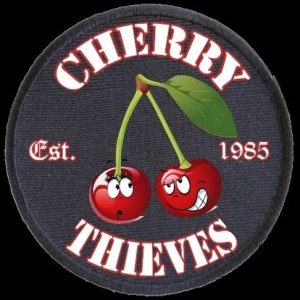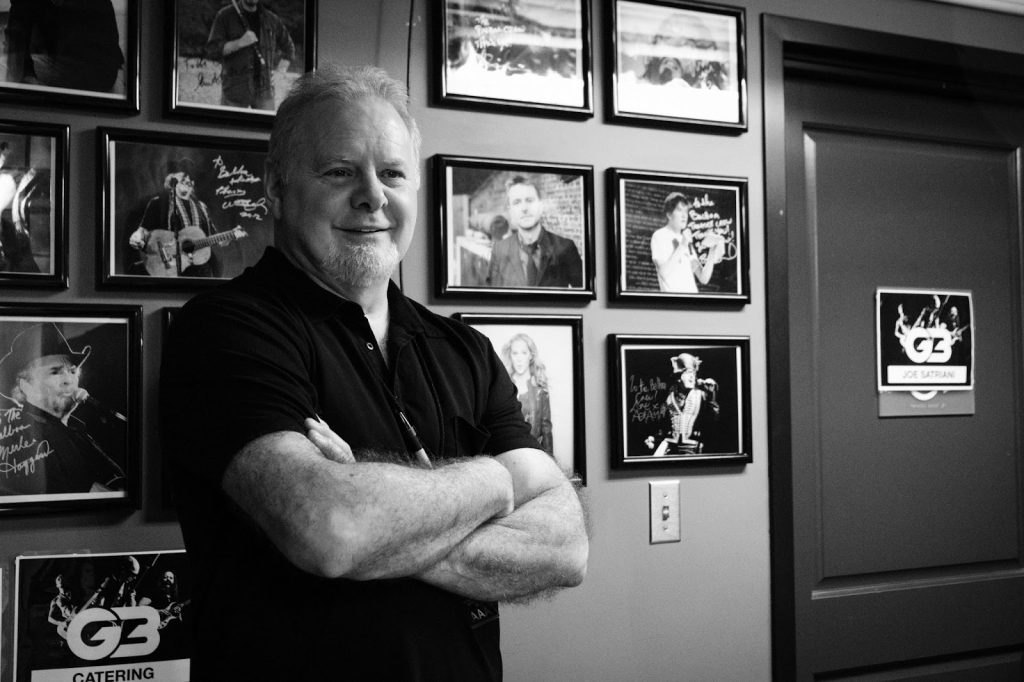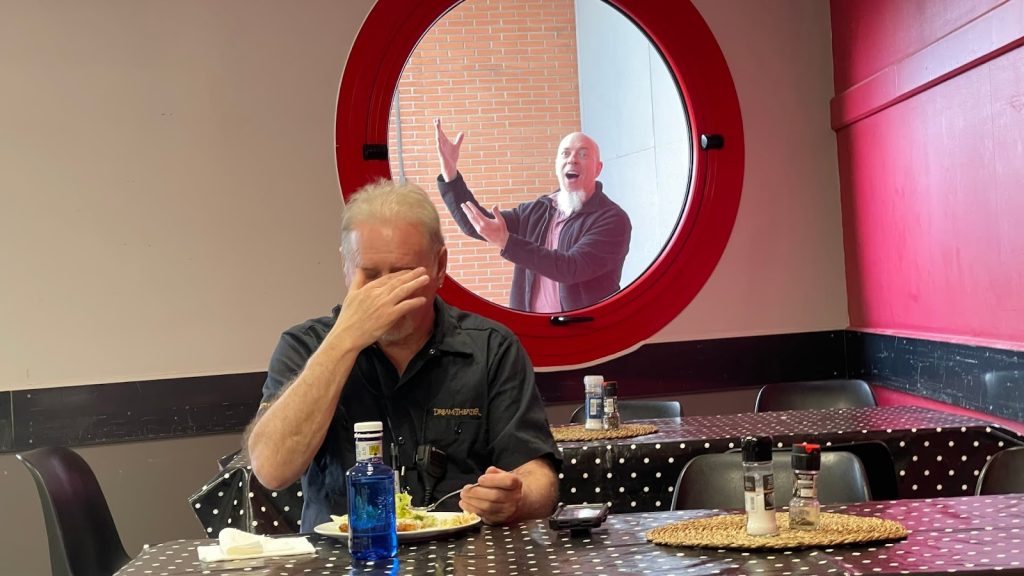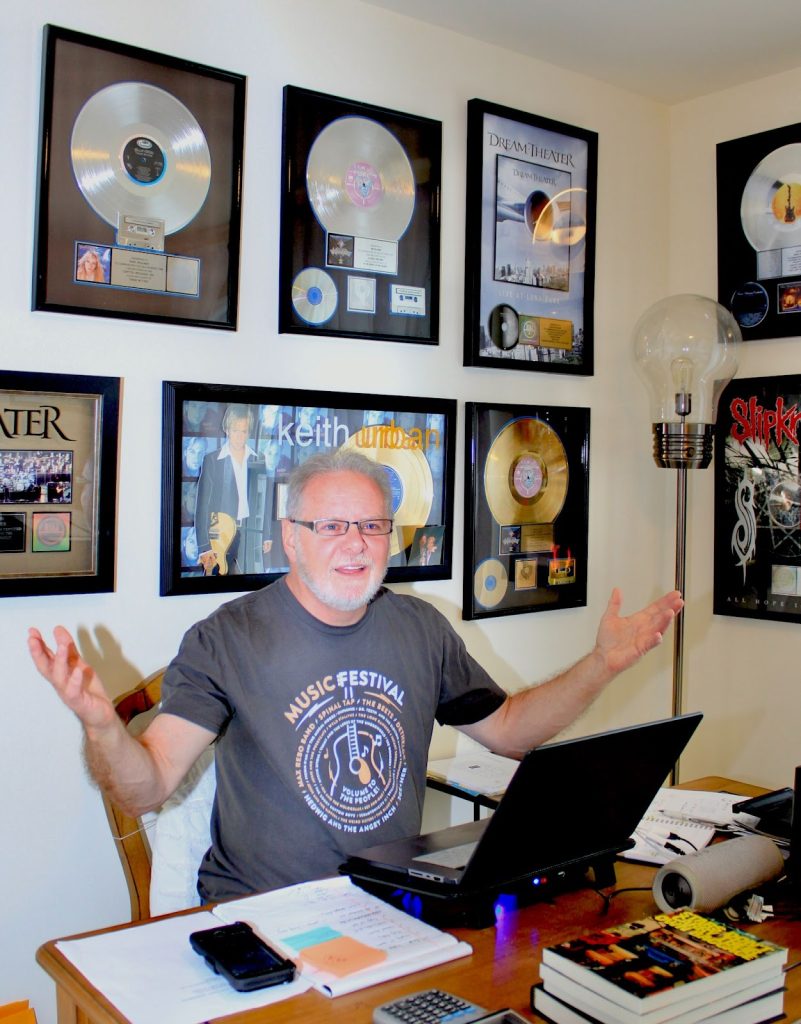DT USA sat down with Rikk Feulner, a seasoned tour manager with over 40 years of experience, managing 38 different bands, and who has been Dream Theater’s Tour Manager for the past 21 years.
Rikk just added published author to his repertoire, with the release of his wildly-entertaining book “Stars Don’t Carry Their Own Baggage”. The book is a collection of his many fascinating stories managing bands as they toured around the world, and it’s fictionalized to an up-and-coming 80’s band named “Cherry Thieves”.
Rikk talks to us about the inner workings of running a tour, what it takes to be a successful tour manager, and he reveals whether all the stories in his book are really true. You will want to read this insightful interview and trust us, you’ll want to pick up a copy of his book! Better yet, keep reading for your chance to win your own autographed copy!

So what inspired the idea to write a book in the first place, and how did you get started?
Basically, COVID. During COVID, the music business, and most of the world, was shut down. There was no work, and there was nothing to do. I was just pacing the floors of my house, all day, every day, and my wife was like, “You’ve got to do something!” So I started making notes for a book. I had all this time I never had when I was touring.
I’ve worked with 38 different bands so I spent time just thinking about one band at a time, which took a couple of weeks. Trying to remember back forty years is not easy when you’re this age!
I picked out the best 50 paragraphs, and I sent them to a publisher I knew. A couple of weeks went by and he wrote back saying, “Listen, I love the stories. I think they’re great. We’ll give you a publishing deal, but you have to name all the bands and all the artists.”
Did that make you consider turning the book into a tell-all?
That’s what they wanted, but I didn’t want to write a book about dirt. I’m still working, and I have a lot of friends in the music business. I spent my whole career making friends and working in this industry. Why would I want to throw everybody under the bus? I didn’t want to get them in a divorce, I didn’t want to break up their bands, I didn’t want to get management fired. Why would I do that?
And I’m like, “No, that’s not going to happen.” He was like, “well, you’d make a lot more money if you do that.” And I told him, “I don’t care about the money.”
Is this why you decided to write about a fictional band?
Yeah, I was a little bummed out, and while driving around I thought, “Why don’t I just make up a band and use all my stories?” Why does it have to be “those” bands? It can be *any* band because this stuff can happen to anyone. So that’s what I did, I started writing about a make-believe band.
 What’s funny is that the band name was probably the hardest part of the whole book. I’m not exaggerating, I changed the name of the band five times in my book. At one point, I had probably 20 to 30 different band names that I came up with. I went online and started looking for them and I was amazed that every single one of them was taken.
What’s funny is that the band name was probably the hardest part of the whole book. I’m not exaggerating, I changed the name of the band five times in my book. At one point, I had probably 20 to 30 different band names that I came up with. I went online and started looking for them and I was amazed that every single one of them was taken.
The stupidest things, like even “Stop Sign.” I thought there’s no way there’s a band named that. Oh, there’s a band called “Stop Sign.” Finally, I thought “Cherry Thieves” would be taken. So I had two guys, some computer-geek friends of mine, scour the Internet and see if they could find anything about this band. They both wrote back three or four days later and said, there’s nothing about this band, and that’s how the name came about. And it’s good within the book, it feels like the story is about one band, and you can’t really pick out what real band did what.
The book was very interesting, and it was such a good read. Some of the stories, I couldn’t believe were true, like the one about finding a body hidden in a box spring in a hotel. I’m thinking to myself, “this can’t possibly be true.”
Every single story in the book is true. I mean, the dead body thing, that was pretty gross. I can still picture that one in my head like it happened yesterday.
Some people just think the whole book is really funny, and some people go, “Wow, that really happened? There’s no way that happened.” A lot of people love the wedding story too, where the fight breaks out. And it’s all true. Whether you want to believe it or not, it’s all true.
Were there any stories that you really wanted to put in the book and you just couldn’t?
Oh, there’s tons. I still have probably 30 or 40 stories that I didn’t use, or couldn’t use because of the nature of the story. The book takes place in 1985 before the Internet… before there was video, or Zoom calls, and all the technology we have today. In 1985 we didn’t have that. Most people didn’t even have cell phones, So there were a lot of other stories that relate to current days that I just couldn’t use.
I’ve also worked with female artists and I just couldn’t use any of those stories because they wouldn’t have made sense with the Cherry Thieves storyline. So yeah, I still have a lot of stories and maybe someday I’ll write another book and use those.
That was going to be my next question, will there ever be a sequel?
I don’t know when I would have time to do it. Maybe when I retire… I’ll think about it, but to be honest, several people have asked me “When’s the next book coming out? I’m excited to read part two!” If I decide to make another book, it’s going to be about the dark side of the music business.
Like when the band gets big and then they start going downhill, start fighting with each other and suing each other, people don’t know that side. They hear about Mötley Crüe suing each other, but they don’t know how often that stuff goes on.
There was one lady who read the book, and she wrote me saying, “I read your book and I love the stories, but there’s one thing that’s been haunting me and I don’t know why, but I guess I never thought about what happens to musicians when they get older, you know. And they’re kind of in their older years and can’t do it anymore.”
She was referring to the story about the musician who played acoustic guitar and had cocaine all over his nose. She goes, “Can you tell me who that was?” She was really bothered by that. So I did tell her who it was, but she’d never heard of them. So every story, different people react differently to.
So let’s talk about your career. How long have you been in the music industry?
40 years. That’s a very long time… I’ve never had another job.
I started playing in bands when I was in high school, and after school, I played in local bands. None of them did well. they were always breaking up, and it was very depressing. I wanted to do something and nobody was taking it seriously.
So anyways, a band in the Albany area started getting very popular. They were getting played on MTV and started to tour a lot. They were looking for people to work with them. So I got a job with them touring around the northeast. I also worked with a couple of local bands, doing lighting and backline work, you know, guitar tech and drum tech work. That’s how I got started. I didn’t become a tour manager until a couple of years after that.
I just kept learning everything I could about the business and trying to make friends and trying to get to the next level. At that point, I decided that my music career was over, and I realized I wasn’t going to succeed as a musician. I decided to do the other side of the music business. The behind the scenes part.

Reading the book, I get a sense that you have so many different roles and responsibilities. For the people that don’t know, what does the Tour Manager do on a tour?
When bands are fighting over this or that, I am the guy that says, “Listen, what’s best for the band is this, and this is what we should do.” I’m also the tour accountant. All the money that comes in and all the money that goes out, I’m responsible for every penny, which in some cases, can be millions of dollars. So if I’m given a budget by Management, or the accountants, I try to keep the tour on budget, which is not easy because you’re always fighting with the band because they want this, and they want that. And it’s like, “No, you can’t have it. It’s not in the budget. Call your manager. don’t yell at me.”
I also deal with all the accommodations, with the travel agent, booking the buses, airline tickets, or if we have a private jet, dealing with that. There’s so much that goes on, checking in and out of the hotels, dealing with the bus because you have to pay the driver, give them gas money, and just accounting for all that.
Keeping everybody on schedule. To be honest with you, being on the roads is like being in the military, everything’s on time. You gotta check out of the hotel on time, you have to soundcheck on time, the doors have to open on time, the shows have to start on time, the shows have to end on time, because there are union costs involved (and which could cost bands thousands and thousands of dollars). If they play 5 minutes over, it could cost them $10,000.
You need to be on the ball at all times and just deal with all that. I’m also the one who sits down with the promoter and goes through all the receipts of the show, all the money that came in for the show, all the money that went out and sometimes argue with them over things that just don’t look right and don’t make sense. For example, if they say, “oh, we spent $10,000 on catering.” And I’m like, there’s no way in hell because all we had was pizza.
He might have spent $1000, but he didn’t spend $10,000. So, there’s a lot of that kind of stuff, and dealing with the promoters, dealing with all the money, is a big part of my job. It’s almost like a babysitter-accountant. I should start a new superhero called the “Accounting Babysitter. ”
That sounds like a lot of responsibilities.
Yeah, and there’s so much more. There are interviews involved , and I have to schedule them and make sure the band does them. Telling people no, because the band doesn’t want to do something- that’s always fun. Also, doing VIPs. Yeah, it’s a lot.
There’s a lot to it and it’s never ending. You sleep when you can. I’m a good sleeper, I could lay down on the floor right here and go to sleep and that’s a great gift I was given. I’ve learned that if we have an hour flight, I’m going to sleep the whole hour. That’s one hour of sleep I just got, and the band guys hate that, because I can get on an airplane, put my head against the window and I’ll be sleeping before the plane takes off, and won’t wake up until the plane hits the ground.
I’ve been doing that for years and years and years. So it’s kind of ingrained in my soul, you have to do it to survive.
Do you get any downtime at all while you’re on a tour?

Not when I’m on tour. When I’m home, I have downtime, of course. But on tour, I’m basically working 24/7, days on and days off. There’s no such thing as a “day off”.
We call it a “non-show day”. You’re still working all day, there’s just no show that night. It’s the same for the production manager. We’re always advancing shows that are coming up, dealing with issues that are coming up, and just always looking ahead to see what the problems could be, and trying to solve the issues before they become problems.
I’ll sit there and I’ll think, oh, next week we’re going to fly to Florida. How are we getting to the airport? How are we getting from the airport to the hotel? I’m always thinking ahead of things I have to arrange and make sure it gets executed properly. There’s a lot to it and it’s never ending. But the main thing is just to always be thinking ahead. We’re going to Asia tomorrow for [Dream Theater’s] Asian leg of the tour, and I’m not even working on that tour.
I’m working on the U.S. tour right now, which doesn’t start for a couple of months, but that’s how far ahead I am. Same with the production manager, we’re already planning way ahead.
That’s amazing and exhausting! So has traveling become more challenging after COVID? Even just for regular people booking flights has become more challenging with delays, cancellations, etc.
Not so much with booking flights, but traveling to other countries has become more challenging because every country has different COVID requirements. Some have you fill out an app, others you need a COVID card to show that you’ve had shots, or set up PCR tests for those that don’t have more than two shots. There are a lot more steps. The production manager and I are working constantly on it.
COVID changed a few things, and because of COVID a lot of bands aren’t doing meet and greets anymore, as people are still getting it. Actually, a friend of mine just got it. He just told me two days ago that he got COVID again. So it’s still out there you know.
We’ve been talking about all the things you do and all the responsibilities that come with it, but what is your favorite thing about your job; What do you enjoy the most?
Me and the production manager have a saying, when the band goes on stage “We’ve sent the kids off to school”. That hour and a half, or two hours, is our quiet time so that we can get other work done.
Once the house lights go off, and the band’s on stage, we did it and that’s what it’s all about. It’s making the shows happen. It’s all about getting the show up, getting the band on stage, making the fans happy and then finishing on time and packing it up to get to the next show on time. Every day is not stressful, but there’s a lot of times that the day is very much so.
Just making it happen makes you happy, you know? It’s like any job. When you do your job and everything goes well, you’re happy. “I did it!” a sense of accomplishment. You feel like you’ve done something today with your life, and just knowing that fans are happy makes me happy because I’m a music fan too. I own thousands of different CDs, albums, DVDs and bootlegs and I can relate to the fans being excited to see their favorite band. I’m one of those people and I’m just happy that the show is happening for them.
What would you say is one of the most challenging things about your job?
Well, that varies from band to band. One of the biggest challenges is, like I mentioned before, all the different COVID requirements wherever you go in the world. One day there’s nothing and then the next day, there’s like five different things they want, and this test, and that test, and just trying to keep it all straight. You can go to South America one month, and then Asia another month, and it’s totally different.
As far as the bands go, just keeping them on time, the way they get caught up in their own little bubbles and forget what they’re doing, and where they are. Just keeping everybody, band and crew, on time. That can be challenging at times. “It’s like herding cats,” I say. Take 50 cats and put them in a room and say, okay, everybody come this way, and they go in all different directions.
You’ve been in the business for 40 years, and you’re obviously very good at what you do. What do you think it takes to be a successful tour manager?
Well, it’s not only about being good at what you do, but also about being honest. I hear stories of tour managers who rip off their bands and steal hundreds, and hundreds of thousands of dollars and then disappear.
I heard a story of a tour manager that lost all the money gambling, and in the middle of the night, he piled all the band and crew’s passports up in front of the lead singer’s door late at night, and then left the tour. No one ever saw or heard of him again. He even disconnected his phone. The management and the accountants tried to find him, and I don’t know if they ever did.
To be successful, you’ve definitely got to be clean. You can’t have gambling problems or drug problems, or things that are going to make you want to steal money. You have to do a good job and you have to be honest. You cannot be drunk, or on drugs or any of that stuff, you have to be responsible.
I have a saying that the tour manager has to be the responsible one in the room, or the adult in the room at all times. Let the band do whatever they want to do. Like, one band I worked with, they were a mess. They were drinking and drugging all the time and breaking things, they were just out of control. I just let them do it because it’s their money. It’s not my money that’s paying for all the damage. It’s theirs. So hey, it’s their life, you know?
Also just being on the ball, thinking forward all the time and knowing it’s not about you. It’s never about me, It’s always about the band. It’s always about the show. In my mind, I’m way down the totem pole. Everybody else comes before me.

So as the tour manager, who do you answer to?
The band and the management. Those are the two big ones. Because, my job is to keep the band happy, if they have a problem, then I have to deal with it and answer to them.
Always be nice to the managers and always be nice to the accountants, and I’ll tell you why, because they have other bands too. They might not be managing this band tomorrow, but they have five other bands, and if they like you, you’ll work with their bands.
There are management companies where I’ve worked with three or four of their other artists, because of what I did for one of their artists. Same with the accountants. If your paperwork is in order, and it’s easy for them to know where all the money went, then they’re going to call you to do other tours.
There are tour accountant jobs which I’ve done before. You don’t even deal with the band, and you don’t deal with the crew. All you do is handle the money, but those are bigger tours of course. Arena tours and outdoor stadium tours, and stuff like that where you’re dealing with millions and millions of dollars.